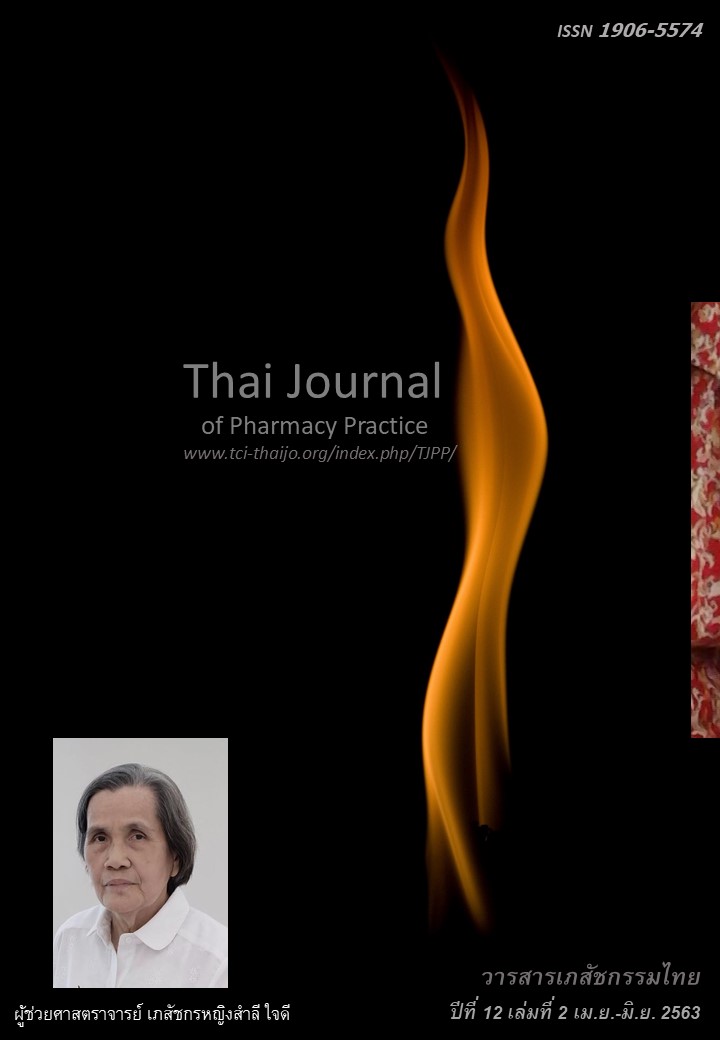พฤติกรรมการดูแลการใช้ยาของผู้ที่มีหน้าที่ปฏิบัติงานในโรงเรียนจังหวัดนครนายก
Main Article Content
บทคัดย่อ
วัตถุประสงค์: เพื่อสำรวจรายการยาและการจัดการยาในโรงเรียน รวมทั้งศึกษาปัจจัยทำนายพฤติกรรมการดูแลการใช้ยาในโรงเรียน (drug management practice in schools: DMPS) ของผู้ที่มีหน้าที่ปฏิบัติงานในห้องพยาบาลวิธีการ: กลุ่มตัวอย่างมี 2 กลุ่ม คือ1) โรงเรียนในจังหวัดนครนายก 134 แห่ง และ 2) บุคลากรผู้มีหน้าที่ปฏิบัติงานในห้องพยาบาล โรงเรียนละ 1 คน รวม134 คน เครื่องมือเก็บข้อมูล คือ แบบสำรวจรายการยาและการจัดการยาในโรงเรียน และแบบสอบถามปัจจัยทำนายพฤติกรรม DMPS ผลการวิจัย:โรงเรียนทุกแห่งมียาสามัญประจำบ้านและเวชภัณฑ์เพื่อให้บริการรักษาพยาบาลเบื้องต้น รายการยาที่ใช้บ่อยที่สุด 5 อันดับแรก คือ1) ยาแก้ปวด 2) ยาธาตุน้ำแดง 3) น้ำเกลือล้างแผลและยาใส่แผล 4) ยาธาตุน้ำขาว และ 5) ยาทาแก้ผื่นคัน นอกจากนี้ยังพบยาปฏิชีวนะและยาแก้หวัดที่มีส่วนผสมของ psuedoephredrine โรงเรียนร้อยละ 94 มีห้องพยาบาลเป็นสัดส่วนและครูเป็นผู้ดูแลห้องพยาบาล เกือบทุกแห่งมีตู้ยาและวางในตำแหน่งที่เหมาะสมมีป้ายบอกชัดเจน มีการจัดการยาที่ดี เจตคติการคล้อยตามกลุ่มอ้างอิง และการรับรู้การควบคุมพฤติกรรม DMPS สามารถร่วมกันทำนายเจตนาใน DMPS ได้ร้อยละ 76.8 (p<0.01) นอกจากนี้เจตนาในDMPS และความรู้เกี่ยวกับการใช้ยาสามารถร่วมกันทำนายพฤติกรรมDMPS ได้ร้อยละ 29.6 (p<0.01) สรุป: เจตนาในการกระทำพฤติกรรมและความรู้เกี่ยวกับการใช้ยาส่งผลโดยตรงต่อพฤติกรรม DMPS ดังนั้น การจัดกิจกรรมเพื่อพัฒนาความรู้เกี่ยวกับการใช้ยาและส่งเสริมให้บุคลากรมีความความตั้งใจสูงใน DMPS จะช่วยส่งเสริมพฤติกรรม DMPS ให้ดีขึ้น
Article Details

อนุญาตภายใต้เงื่อนไข Creative Commons Attribution-NonCommercial-NoDerivatives 4.0 International License.
ผลการวิจัยและความคิดเห็นที่ปรากฏในบทความถือเป็นความคิดเห็นและอยู่ในความรับผิดชอบของผู้นิพนธ์ มิใช่ความเห็นหรือความรับผิดชอบของกองบรรณาธิการ หรือคณะเภสัชศาสตร์ มหาวิทยาลัยสงขลานครินทร์ ทั้งนี้ไม่รวมความผิดพลาดอันเกิดจากการพิมพ์ บทความที่ได้รับการเผยแพร่โดยวารสารเภสัชกรรมไทยถือเป็นสิทธิ์ของวารสารฯ
เอกสารอ้างอิง
2. Yimlamai A, Chanthapasa K. Medication manage ment in the schools in Phrayuen District, Khonkaen Province. Isan Journal of Pharmaceutical Sciences 2016; 11: 218-28.
3. National Association of School Nurses. Medication administration in school: position statement [online] 2017. [cited Oct 1, 2019]. Available from: www.na sn.org/nasn/advocacy/professional-practice-docum ents/position-statements/ps-medication.
4. Maughan ED, McCarthy AM, Hein M, Perkhounkova Y, Kelly MW. Medication management in schools: 2015 survey results. J Sch Nurs 2018; 34: 468-79.
5. Pharmaceutical System Research and Development (PhaReD) Foundation. Helping schools manage their medicines and related services. Bangkok: PhaReD Foundation; 2010.
6. Department of Health, Ministry of Public Health. Health promoting school operational manual (revised version 2015). Academic Service Office. Nakorn Prathom: Silapakorn University; 2015.
7. Anuwong K, Kwanboonchan S, Susoarat P, Sukharo mana R, Yensabye A, Jearajit C, et al. Medication services in primary schools, Bangkok. Journal of Faculty of Physical Education 2012; 15: 396-407.
8. Auamimpuch J. Chaiywan S. Drug storage and drug knowledge of nursing room staff at the schools under the Office of Basic Education, Muang District, Chiang Mai Province [special problem]. Chiangmai: Chiangmai University; 2012.
9. Apaisoongnern A, Chanthapasa K. Medication management in school: A Case study in high school at Roi Et Province. Proceeding of the 20th National Graduate Research Conference; 2019 Mar 15; Khonkaen, Thailand. Khonkaen University; 2019. p.1081-94.
10. Montaño DG, Kasprzyk D. Theory of reasoned action, theory of planned behavior, and the integrated behavioral model. In Glanz K, Rimer BK, Viswanath K, editors. Health behavior and health education: theory, research, and practice. 4th ed. San Francisco: John Wiley & Sons; 2008.
11. Ajzen I. The theory of planned behavior. Organ Behav Hum Decis Process1991; 50: 179-211.
12. Mullan BA, Wong C, Kothe EJ. Predicting adoles cents' safe food handling using an extended theory of planned behavior. Food Control 2013; 31: 454-60.
13. Ajzen I, Joyce N, Sheikh S, Cote NG. Knowledge and the prediction of behavior: the role of informa tion accuracy in the theory of planned behavior. Basic Appl Soc Psychol 2011; 33: 101-17.
14. Ajzen I. Constructing a TPB questionnaire: Concept-ual and methodological considerations [online]. 2006 [cited Mar 31, 2017]. Available from people. umass.edu/aizen/pdf/tpb.measurement.pdf.
15. Francis JJ, Eccles MP, Johnston M, Walker A, Grimshaw JM, Foy R, et al. Constructing question naires based on the theory of planned behaviour: A manual for health services researchers [online]. 2004 [cited Dec 1, 2018]. Available from: open access.city.ac.uk/id/eprint/1735/1/TPB%20Manual%20FINAL%20May2004.pdf
16. Notification of the Ministry of Public Health on modern household medicines. Royal Gazette No. 116 Part 38D (May 13, 1999).
17. Erjongmanee A. Situation of medication uses in first aid room of educational institutes in Samutsakorn province [master thesis]. Pitsanulok: Naresuan University; 2010.
18. Kitpinyo R, Somyos S. Practices of school nurses in primary and secondary schools at Chiang Mai. [special problem]. Chiangmai: Chiangmai University ; 2014.
19. Bandura A. Social learning theory. Englewood Cliffs, NJ: Prentice-Hall; 1977.


